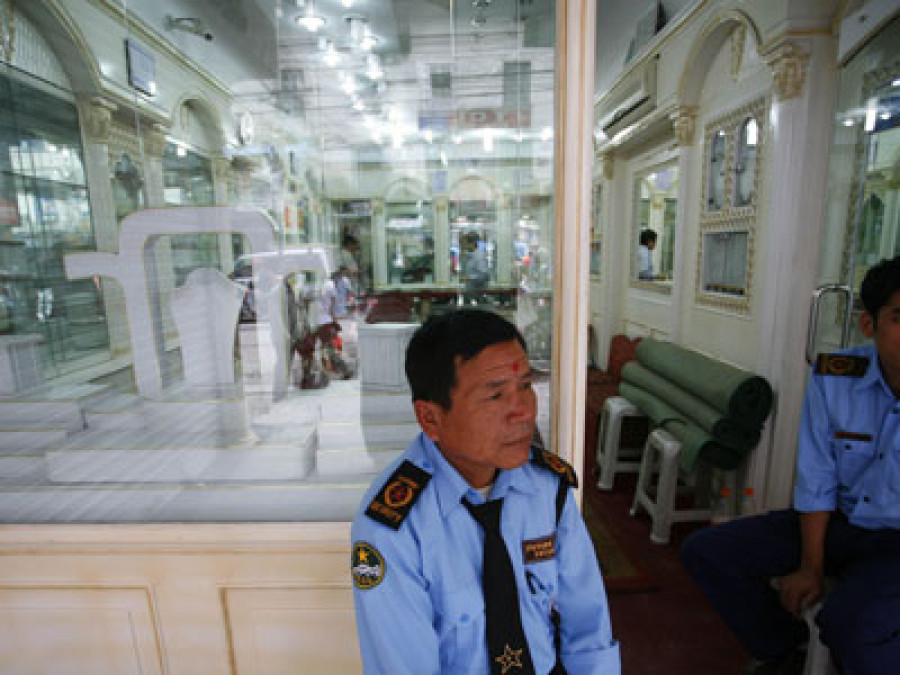Valley
M’sian security training in Nepal is illegal: Govt
Malaysia’s newly-introduced scheme to provide mandatory pre-departure training for Nepali security guards is against the law and an attempt to infringe Nepal’s rights
Malaysia made it mandatory for Nepali security guards to undergo one-month training from selected training centres in Kathmandu from the beginning of January. The training will incur an extra financial burden of RM600 (Rs 18,500 including tax) on aspiring workers.
Teleport Sdn Bhd, a Malaysian government’s authorised agent to oversee the training, has given exclusive training rights to six local centres in Nepal.
The MoLE, which issued written objection to the controversial system, said that firms providing the training will face action. The ministry said it has not come across any training centres providing such trainings so far.
“We have absolutely no problem if they upgrade the syllabus or set criteria for selection. But we cannot accept any country take hold of our internal process. We have clearly stated with the Malaysia government that they cannot decide whether or not certain training centres in Nepal are eligible to provide the training. They cannot put additional financial burden upon workers either,” said Buddhi Bahadur Khadka, MoLE spokesperson.
Malaysia expects to recruit around 60,000 security guards from Nepal, according to the Security Services Association of Malaysia. It has recruited some 12,500 Nepali security guards since 2011. Nepalis are the only foreign nationals qualified to work in Malaysia as security guards.
Concerned stakeholders in Nepal said the training cost of demanded 60,000 workers is likely to exceed Rs 1 billion. The Teleport Sdn Bhd gets Rs 7,500 from each trainee while the rest will go to the training centres.
Though hundreds of security centres are providing training to outbound Nepali migrant workers, the Malaysian agency has outsourced the service to Bir Gurkha Securities, Metro Security, Shikhar International Training Institute, Kathmandu Security Service, Valor International Nepal and Allied Security Service. Sources at the Labour Ministry said State Minister Tek Bahadur Gurung is unwilling to initiate any action against the new system due to his personal interests. One of the centres allegedly belongs to Gurung’s relatives.
The training has added to financial burden of Nepali migrant workers who are paying much higher than the fee limit set by the government. Malaysia-bound Nepali security guards pay between Rs 200,000-300,000 in absence of proper mechanism to check such anomalies.
“Since Nepali security guards earn RM 1,450 working 11 hours a day and 28 days a month, it takes nearly one year for them to pay back the debt they take while going abroad. So, it is against the interest of migrant workers,” a recruiting agency official said.
However, member agencies of the Security Services Association of Malaysia claim that the new provision will ultimately benefit the workers. They claim that the training will help workers get better salary while enhancing their professional efficiency. “The presence of Malaysian agencies for interview will control infiltration of layers of agents in recruitment process and discourage admission of those from the non-military background. They can even negotiate in the payment prior to the training. It will ultimately benefit the workers,” said Sukumaran NK Nair, manager of Malaysia-based KAMI Security Service, which is one of the 784 security agencies authorised to recruit workers from Nepal.
Nair, who was recently in Kathmandu for an interview of aspirant workers, claimed that Nepali security guards are fetching up to RM 1,800. He claimed there is no possibility of withdrawal or suspension of the system as it was decision taken by the Malaysian Cabinet.
Stakeholders in Nepal, however, are wary of deliberate meddling of Malaysian government in recruiting process through admission of numerous of agents.
Last month, Malaysia unsuccessfully tried to start biometric visa system from Nepal and Bangladesh. The system was suspended following widespread criticisms from within and outside the country. In November 2013, Malaysia increased visa processing fee from Rs 700 to Rs 3, 900, outsourcing the job to a private firm named Malaysia VLN, Nepal.




 7.12°C Kathmandu
7.12°C Kathmandu








